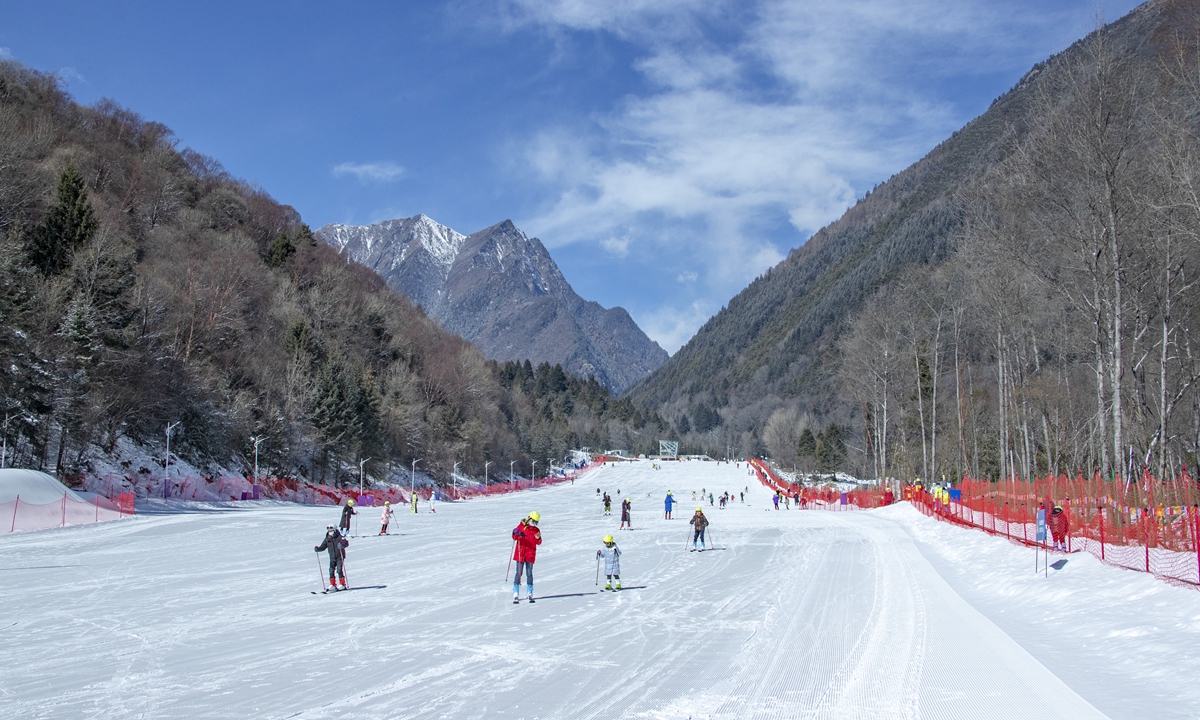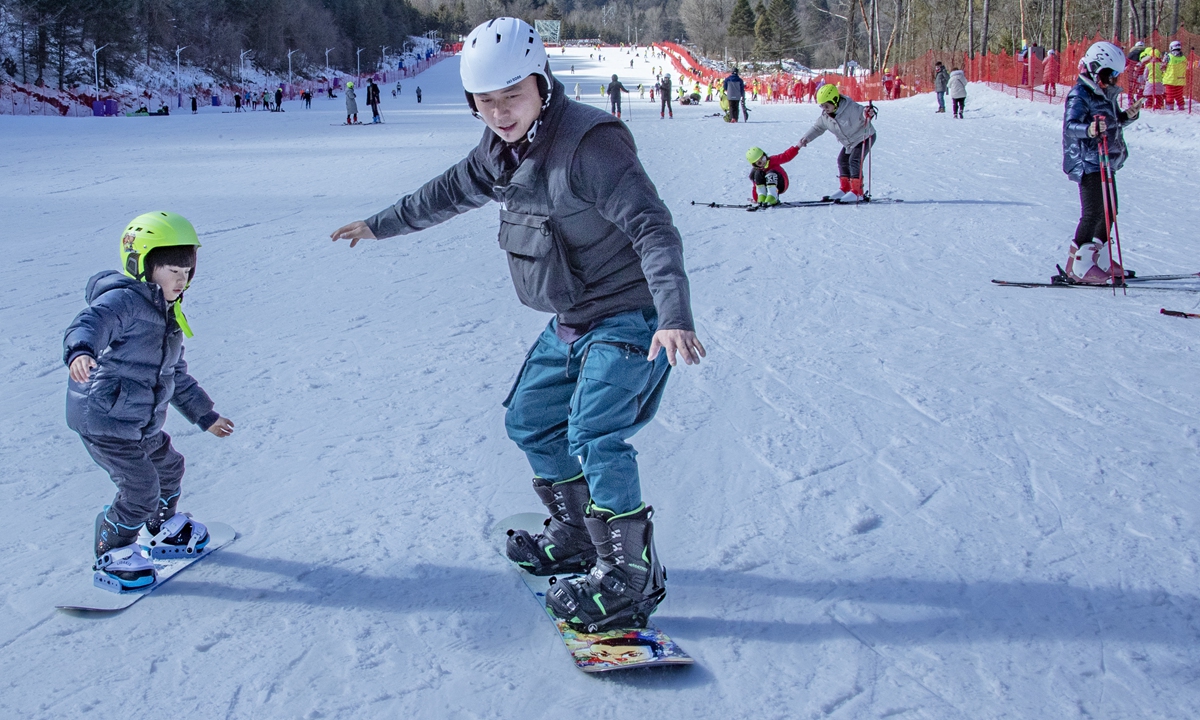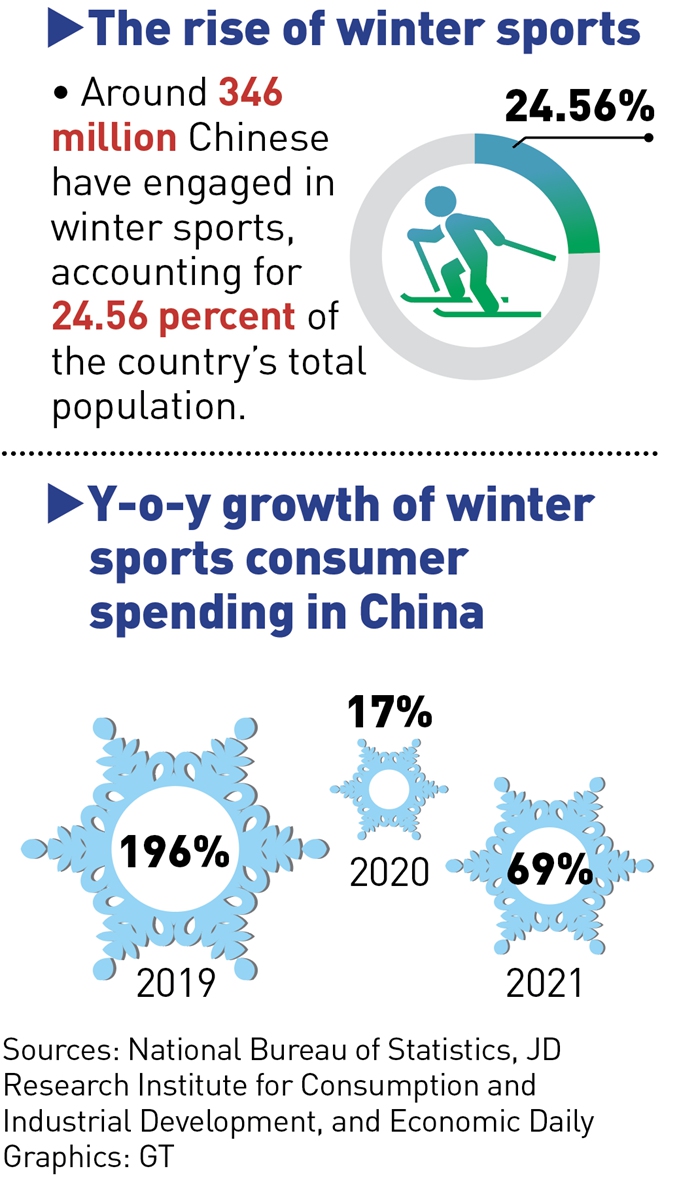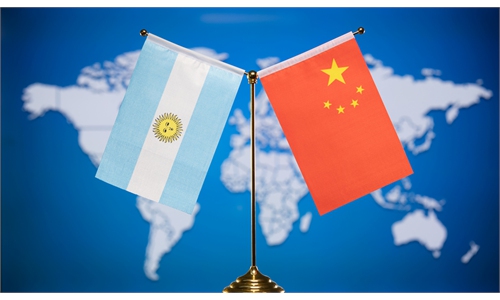
Tourists ski at the Mengtunhegu ski resort at the Aba Tibetan and Qiang Autonomous Prefecture in Southwest China's Sichuan Province on February 9, 2022. Photo: VCG
The Beijing 2022 Winter Olympic Games, a global sporting event held amid the challenges created by the global pandemic, has left an indelible mark on the world for its "simple, safe and splendid" vision, while opening a new chapter for the people-to-people exchanges and business cooperation between countries along the Belt and Road Initiative (BRI) for participating in a potential 1.4 billion winter sports market.
While China's Winter Olympics is deepening the people-to-people exchanges in the forms of training athletes and future talents for countries along the BRI, the booming market has also created new possibilities for cooperation and investment in China, making the country a new attraction hub for international sports fans.
From 2015 to 2020, the total size of China's snow and ice industry grew from 270 billion yuan ($42.46 billion) to 600 billion yuan, which is expected to grow to 1 trillion yuan by 2025, data from Winter Sports Development Program (2016-2025) revealed, according to reports on China's winter sports industry development.
Behind the encouraging figures, the momentum generated is pushing winter sports industry into a new economic growth cycle.
Experts claim that the big prize delivered by the preparations for the Beijing Winter Olympic Games will not only supercharge winter sports in China, but also propel the development of winter sports to a new level globally, especially between China and the Belt and Road countries where strong cultural connectivity and industry complementarities can be found.
As early as August 2019, the State Council issued a document emphasizing the need to strengthen sports exchanges and cooperation with key countries and regions, including actively participating in intergovernmental cultural exchange activities and promoting in-depth sports tourism with the BRI countries.
Experts said that although the global pandemic has made normal cross-border tourism difficult, the promotion of exchanges in the sports industry among the countries along the Belt and Road has not been disrupted.

An adult teaches a child how to ski at the Mengtunhegu ski resort at the Aba Tibetan and Qiang Autonomous Prefecture in Southwest China's Sichuan Province on February 9, 2022. Photo: VCG
People-to-people exchanges
In the process of deepening the enhanced construction of the Belt and Road, sports events undertake the mission of promoting exchanges with countries along the BRI.
During the Winter Olympics, leaders from many countries mentioned the need to strengthen sports and cultural education with China during their visits.
The remarks came on the sidelines of the athletes training programs that have already found their roots in China.
On Chinese social media, Chinese-Hungarian skater Liu Shaolin, who fluently speaks a northeastern Chinese dialect, quickly became popular. He and his brother Liu Shaoang trained in China since they were children and played the role as the "ambassadors of China-Hungary sports culture."
People-to-people exchanges for the winter sports event have also borne fruits between China and Nordic countries, with significant cooperation in winter sports training and instruction on both sides.
Juha Tuominen, chairman of the Finnish Business Council Beijing, told the Global Times, that "thanks to its complete facilities, Finland has attracted many Chinese teams to train there. Due to the increasingly frequent cooperation, many coaches and sports teams from Finland have chosen to teach in China."
Tuominen said that even during the epidemic, China and Finland are still very active in the winter sports space.
Taking advantage of the favorable opportunity of the Beijing Winter Olympics, the Chinese government has helped the public reimagine winter sports.
What impressed Tuominen the most is that since the vision that the Winter Olympics will drive 300 million people to participate in winter sports was proposed in 2014, the development of China's winter sports industry has accelerated significantly, especially in the construction of ice and snow sports venues.
China's technology and capability in infrastructure has also helped the neighboring Pakistan in its winter sports development.
In the recent interview with the Pakistani Prime Minister Imran Khan, Khan mentioned that while there is no tradition of winter sports in Pakistan, they are now paying attention to the opportunity for the first time, thanks to China's support.
"The main place where we could exchange winter sports is in remote northern areas that neighbours China's Xinjiang Uygur Autonomous Region. It is China that has helped us to build the Karakoram Highway which links northern areas to other parts of Pakistan," the prime minister said.
At present, the number of participants in ice and snow sports in China has reached 346 million, with the participation rate of residents reaching 24.56 percent, data from the National Bureau of Statistics showed.
"The construction of ice and snow stadia has attracted more attention, which can be seen in many places in northern China including Heilongjiang, Zhangjiakou and Chongli in Hebei," Tuominen said. He believes the Beijing Winter Olympics is a milestone in the development of China's ice and snow industry.

Greater market opportunities
In addition to cultural exchanges, the booming Chinese winter sports market has become an ideal landing ground for businesses from BRI countries
With China's goal of 300 million people going on winter sports, Lü Shengming, marketing and sales director of TechnoAlpin China, has witnessed the rapid development of China's winter sports industry and its huge market potential.
This Italy-based winter sports equipment company has undertaken snowmaking construction and event guarantee services for six Winter Olympics, and is currently providing snowmaking equipment and system construction services for all snow venues at the Beijing Winter Olympics.
The company's cooperation in China does not end with the completion of the Beijing Olympics. Instead, through participating in the grand event, the company has set a clearer goal ahead for its bigger expectation in the Chinese market.
Now there are more and more people, especially young people, in ski resorts. Lü believes China's winter sports market is highly sustainable.
"We will strengthen cooperation with more ski resorts in different regions in China, such as some ski resorts in Beijing and Songhua Lake in Northeast China's Jilin Province...at the same time, we plan to build more manufacturing bases and R&D centers in China to promote the development of the domestic winter sports industry," Lü said.
"Our positioning in terms of technological innovation and accumulated experience are elements of competitive advantage...we hope that these opportunities will soon be accompanied by a return to greater international mobility, so as to further enhance the positive exchanges between our two countries," Paolo Bazzoni, Chairman of the China-Italy Chamber of Commerce, told the Global Times on Thursday.
The initiatives undertaken by the Chinese government in recent years are generating a driving force of business and interest in China's winter sports and tourism sectors - an opportunity not to be wasted for Italian companies, Bazzoni further noted.
Since the proposal to host the Beijing Winter Olympics in 2015, China has made rapid progress in the construction of ski resorts.
Data from the Beijing Winter Olympics Organizing Committee shows that China currently has a total of 654 standard ice rinks and 803 ski resorts, an increase of 317 percent and 41 percent respectively, compared with 2015, according to media reports.
The Olympics has also boosted the technological advancement of Chinese companies to take part in the winter sports.
A Chengdu-based dry ski solution provider JF Dry ski has developed the mushroom-shaped dry ski ground for simulating skiing. The texture of their product is reportedly 90 percent equivalent to the real snow in terms of the skiing experience, according to media reports.
The invention enables skiers to hit the slopes during the summer months or ski in places that hardly see snowfall.
Currently, their product has been adopted in over 40 ski fields in China and also exported to dozens of countries including Belt and Road countries.
"The advancement of science and technology has lowered the cost of winter sports, which is more conducive to the popularization of winter sports in the region," He Wenyi, executive director of the China Institute for Sports Value at Peking University, told the Global Times.
He noted that the BRI is not only about trading goods, but also technology and personnel exchanges, while with the opening of the huge market potential behind the Beijing Winter Olympics, professional winter sports activities will be accessible to more people in China and beyond.



